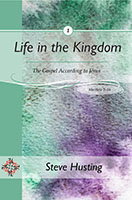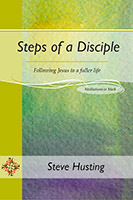A scribe asked Jesus which was the greatest of all the commandments. Jesus answered that these two laws are the framework upon which all the OT laws hang: love God with all you are and love your neighbor as yourself. From Jesus’ answer we can derive some fascinating aspects of the law and its connection to our sinful nature. If we love, then we already fulfill all the commandments; we are living as the God of love has designed us.
In a fascinating twist, all the commandments in the Mosaic books, Proverbs, Prophets, and Psalms are all about helping us see how we as sinners have turned away from loving God to loving self. The law helps us see in what way we are sinners — we don’t love God and man from the heart, or “authentically,” as some like to say.
Paul learned this. In Romans 7:7 he wrote, “I would not have known sin except through the law. For I would not have known covetousness unless the law had said, ‘You shall not covet.'” He passed that lesson on to Timothy: “But we know that the law is good if one uses it lawfully, knowing this: that the law is not made for a righteous person, but for the lawless and insubordinate, for the ungodly and for sinners” (1 Timothy 1:8, 9). So when we compare our behavior to the holy law of love, it helps us see the unholy nature of sin we’ve fallen into. Dark is darker when seen against white. Or sin is greater when viewed against the standards of the law.
The laws reflect the love of God. For instance, a law against kidnapping shows us how much God dignifies us and our freedom, and how horrendous is the act of kidnapping, as seen by its death penalty. These laws should not only cause us to protect our thoughts and civil laws from promoting these acts, but propel us to protect or rescue others from this awful work. They describe evil for what it is. We are not to be passive about evil, but cut it off. This is how we love our neighbor.
The many instructions in the NT against bad behaviors, thoughts, intentions, and attitudes help us recognize the depravity in ourselves and others. The NT warns us against gossip, for instance. Do you gossip? If so, you do not love God or neighbor. We should not be fooled when we see these negative traits in us; we are in grave danger if we make excuses for them.
If we love God and neighbor, we cut off these behaviors. If we love ourselves more, we will keep them as long as they continue to get us what we want, feeding our pride, cravings, or need of power or approval.
In our sin, we have corrupted the purpose of the law. We sinners perverted the function of the law so that by practicing the laws we were able to see ourselves as righteous or good people — exactly the opposite of the law’s purpose. “If I follow this law or principle, then I am a good person.” It became a yardstick by which to measure ourselves against others: “I keep these laws and you don’t, so you’re beneath me.” And so we corrupted the good law and used it to divide people.
Think of church denominations that split up over their differences in rules, or social groups that distinguish themselves by their rules. “If you don’t wear funny hats like we do, you can’t join us.” More division. Less love and unity.
Jesus pointed out this misuse of the law in the Sermon on the Mount. People used fasting to draw people’s attention to promote themselves. But those who used fasting properly drew God’s attention to their petition for help — in private.
The sinner who prayed long prayers did so to gain the admiration of others. Those who have a love relationship with God, though, have longer prayers simply because they had so much to talk about. His presence was real enough that approaching Him privately was fine — no grandstanding was needed.
The Pharisees prided themselves in being Moses’ disciples. They used their adherence to the minutiae of the law to make them more righteous than those who did not operate with the same rigor as themselves. As noted, the law’s purpose was to show us to be sinners and show us how to love our fallen fellow man. In their case, it did neither. We, in our sinful perversion, have warped the law into something to feed our flesh, to feed our vanity.
Our vehicle traffic laws show that we know how to make rules to show proper road courtesy. All of those laws can be summed up with love your neighbor. Thus, breaking them indicates one is not just a lawbreaker, but also not loving the neighbor. As drivers we also know we can follow the rule of the law while also hating the other driver who cut us off. Following a law is no proof that we love another.
Our sin keeps us from seeing the purpose of the law. We are not merely to do what is right, but to have a desire to please and help others. The law shows us what the forms of love should look like. But being sinners, we always fall short; our desire is rooted primarily in helping and loving me, myself, and I.
Gospel preachers, using Romans chapter seven, have taught us that The Ten Commandments can be used to convict people of sin. In reality, almost any OT law can do that. If we break any one of the OT laws, God considers all of them to be broken. We stand condemned. Not living up to the smallest law shows how far from loving God we really are, and how keeping the law to make us feel righteous is a horrendously deceptive tactic of a sinful heart.
We, saved and unsaved, may use the commands in Proverbs, Psalm 119, and other places to see the enormity of our fall and the corruption of our souls. The standard of living is so high that none of us in this fallen race can achieve righteousness through the law. Re-read any chapter from Proverbs chapter 10-30. Are you more the fool or the wise? “I am a mixture of the two.” Then your love has not been perfected. Your self-love is throwing you off. You do not love God and neighbor the way God wants. Yet we foolishly point to good deeds we have done to justify that we are good people — and corrupt the use of the law again!
Paul pointed out several things he took pride in that blinded him from seeing his depravity. He wrapped himself in his country’s flag. He prided himself of belonging to a stricter religious upbringing. He pointed out his family ties as proof he was superior.
We still do this today. Righteousness is by faith in God alone, by faith alone apart from works. When we ask a church-goer the basis of her salvation, she may answer, “I’ve been a good person.” Thus, she was fooled by the law; she used the law not to see her sin but to make herself righteous. She perverted the use of the law. If she answered, “My family has belonged to this denomination for generations,” then she has pointed to posterity rather than faith as worthiness for salvation.
These things could not make a person right with God. Through the patient work of the Holy Spirit, Paul was able to die to these influences and rest upon Christ by faith alone, trusting that Christ will give him the required righteousness at Judgment Day apart from any human means.
What is the remedy? How do we follow the commandments and yet love as Jesus wants? The answer is to look beyond the law to the Lawgiver Himself. In his epistle against the Jews who were trying to compel the Gentiles to keep the Jewish laws, Paul wrote, “For I through the law died to the law that I might live to God” (Galatians 2:19).
He explains this further in Romans chapter seven where he tried to keep the laws to be righteous and find life, but he found death. The law warned against covetousness. Paul found through the law that he was covetous. The law did nothing to relieve him of the sin; it only condemned him for having it. Again, go back and read the Ten Commandments. Who hasn’t stolen at one time or another? Who hasn’t borne false witness at one time? Go back and read through Proverbs. Who has all the qualities of the wise man? Very few. Every verse where we do not measure up condemns us. We are not righteous. We are not to use the law to look righteous in our eyes, but to see the horror that infests our hearts.
Paul, brought to this place, exclaims the remedy: “O wretched man that I am! Who will deliver me from this body of death? I thank God — through Jesus Christ our Lord” (Roman 7:25-26a). Who will deliver me from this constant grasping from trying to do good and trying not to do evil? Not through more of the law; not by trying harder; not by doing it over; not through self-effort of any kind, but through Jesus Christ. Paul leaped over the law to rest in Jesus. He died to the law that he might live to God.
This is the remedy that enables us to love as God intended. “For the death that He died, He died to sin once and for all, but the life that He lives, He lives to God. Likewise you also reckon yourselves to be dead indeed to sin, but alive to God in Christ Jesus our Lord. Therefore do not let sin reign in your mortal body, that you should obey it in its lusts” (Romans 6:10-12).
It is surrendering to Christ by faith that frees us from the ball and chain of the law. The faith God requires is that we trust that He will grant us all the righteousness we need — through Jesus Christ. What is your basis of righteousness? What do you point to that will help you get into heaven? What works do you rely on to pass the judgment of God? What self-effort do you laboriously maintain to keep up the pretense of righteousness? If you are pointing to anything you have done, then it is disqualified on the basis that it is not of faith in Jesus.






